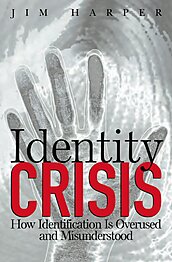Identity Crisis is available in stores and online, wherever books are sold.
Amazon • Barnes & Noble • Google Play
The advance of identification technology biometrics, identity cards, surveillance, databases, dossiers threatens privacy, civil liberties, and related human interests. Since the terrorist attacks of September 11, 2001, demands for identification in the name of security have increased. In this insightful book, Jim Harper takes readers inside identification a process everyone uses every day but few people have ever thought about. Using stories and examples from movies, television, and classic literature, Harper dissects identification processes and technologies, showing how identification works when it works and how it fails when it fails. Harper exposes the myth that identification can protect against future terrorist attacks.
He shows that a U.S. national identification card, created by Congress in the REAL ID Act, is a poor way to secure the country or its citizens. A national ID represents a transfer of power from individuals to institutions, and that transfer threatens liberty, enables identity fraud, and subjects people to unwanted surveillance. Instead of a uniform, government-controlled identification system, Harper calls for a competitive, responsive identification and credentialing industry that meets the mix of consumer demands for privacy, security, anonymity, and accountability.
Identification should be a risk-reducing strategy in a social system, Harper concludes, not a rivet to pin humans to governmental or economic machinery.
